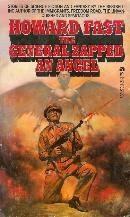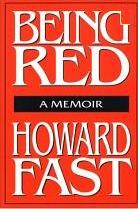 "The General Zapped An Angel"
"The General Zapped An Angel" "The Mouse"
"The Vision of Milty Boil"
"The Mohawk"
"The Wound"
"Tomorrow’s Wall Street Journal"
"The Interval"
"The Movie House"
"The Insects"
 several landmarks in literary history. His 1951 novel, Spartacus, was the basis for Stanley Kubrick‘s classic film, and one may wonder if the book would be remembered at all were it not for that fact. His 1944 Reconstruction-era historical novel, Freedom Road, which opens with a foreword by W.E.B. Du Bois, was one of the most widely read books of the twentieth century, but today does not even enjoy the popular recognition of a Wikipedia article. Once celebrated as a world-class author in some quarters, and in others so reviled that he was persecuted in ways which had no precedent in the history of the United States, he is today not only obscure (certainly by comparison with, for instance, his daughter-in-law Erica Jong), but that obscurity is so taken for granted that it is rarely even commented upon. (The sole exception I can think of is Ilya Baranikas‘s obituary for the Moscow News in March 2003, easily the most complimentary of those I encountered.)
several landmarks in literary history. His 1951 novel, Spartacus, was the basis for Stanley Kubrick‘s classic film, and one may wonder if the book would be remembered at all were it not for that fact. His 1944 Reconstruction-era historical novel, Freedom Road, which opens with a foreword by W.E.B. Du Bois, was one of the most widely read books of the twentieth century, but today does not even enjoy the popular recognition of a Wikipedia article. Once celebrated as a world-class author in some quarters, and in others so reviled that he was persecuted in ways which had no precedent in the history of the United States, he is today not only obscure (certainly by comparison with, for instance, his daughter-in-law Erica Jong), but that obscurity is so taken for granted that it is rarely even commented upon. (The sole exception I can think of is Ilya Baranikas‘s obituary for the Moscow News in March 2003, easily the most complimentary of those I encountered.) Alas, there is no shortage of explanations for this case of affairs. In his lifetime, the critics generally regarded Fast as a pop writer, "middlebrow" at best, and such writers are not expected to be remembered for very long after they put down the pen (and sometimes before that), no matter how well they sell in their lifetimes. Fast’s penchant for writing unfashionably uncomplicated heroes, and his accessible, straightforward literary style in a century dominated by Modernist experimentalism, only played into that prejudice. So did his sheer commercial success as America came "to honor its most widely read authors less and less and to celebrate obscure academic writers with little appeal to the general reading public," as Andrew Macdonald notes in his 1996 study Howard Fast: A Critical Companion. And of course, that his body of work included mysteries, children’s books and—horror of horrors!—science fiction, as well as extensive writing for television, only added to their view that he was a writer of "insufficiently serious" literature. (That same diversity also makes him difficult for academics to tackle, because of the challenge it poses to those who would write about him with scholarly thoroughness. Too broad an expertise is required, and then there is the sheer inconvenience posed by the unavailability of many of his works.)
Alas, there is no shortage of explanations for this case of affairs. In his lifetime, the critics generally regarded Fast as a pop writer, "middlebrow" at best, and such writers are not expected to be remembered for very long after they put down the pen (and sometimes before that), no matter how well they sell in their lifetimes. Fast’s penchant for writing unfashionably uncomplicated heroes, and his accessible, straightforward literary style in a century dominated by Modernist experimentalism, only played into that prejudice. So did his sheer commercial success as America came "to honor its most widely read authors less and less and to celebrate obscure academic writers with little appeal to the general reading public," as Andrew Macdonald notes in his 1996 study Howard Fast: A Critical Companion. And of course, that his body of work included mysteries, children’s books and—horror of horrors!—science fiction, as well as extensive writing for television, only added to their view that he was a writer of "insufficiently serious" literature. (That same diversity also makes him difficult for academics to tackle, because of the challenge it poses to those who would write about him with scholarly thoroughness. Too broad an expertise is required, and then there is the sheer inconvenience posed by the unavailability of many of his works.)
As if all this is not enough, politics, too, plays a part. Political fiction tends to be regarded as artistically suspect, critics all too prone to condemn it as a mere vehicle for the author’s message, often disingenuously. The simple truth is that a total retreat from politics has never been a prerequisite for art, even assuming that such is possible, but the belief that this is the case often provides a convenient cover for the prejudices of critics. Writers they agree with (or whose politics simply go over their heads, as with Dante or Shakespeare) are commonly credited with being "timeless," transcending the time and place of their inspiration or subject matter. Those they disagree with they charge with being vulgar propagandists (something that can certainly be said of Shakespeare as the author of Henry V, but which no one ever dares say).
 Fast certainly never shied away from the political, and his politics were not of a safe sort. While he was "above all a humanist," he was also a member of the Communist Party for a period of several years, which led to his not only being blacklisted, but spending three months in jail for refusing to name names. (It also led to J. Edgar Hoover personally using the FBI to intimidate several major publishers into not taking Spartacus from him, an episode to which Fast devotes a full chapter of his autobiography Being Red.) He broke with the Communist Party in 1956, but unlike a great many ex-Communists who swung all the way over to the right afterward (as for instance, Kingsley Amis did at about the same time), Fast remained on the political left.
Fast certainly never shied away from the political, and his politics were not of a safe sort. While he was "above all a humanist," he was also a member of the Communist Party for a period of several years, which led to his not only being blacklisted, but spending three months in jail for refusing to name names. (It also led to J. Edgar Hoover personally using the FBI to intimidate several major publishers into not taking Spartacus from him, an episode to which Fast devotes a full chapter of his autobiography Being Red.) He broke with the Communist Party in 1956, but unlike a great many ex-Communists who swung all the way over to the right afterward (as for instance, Kingsley Amis did at about the same time), Fast remained on the political left.
It should be noted that Fast’s politics were an asset in certain circumstances (he enjoyed enormous popularity in the Soviet bloc, for instance), but in recent decades, this has generally been a liability, given the marginalization of the Left generally, and leftist culture along with it, a theme that in recent years has been treated in several books by Professor M. Keith Booker (who is, incidentally, also one of academia’s more interesting writers on science fiction). Even in Russia, Fast has gone from being required reading to barely having his passing noticed.
As a science fiction writer, Fast may be even less well remembered than as a writer of historical novels. Still, while even the handful of academics who have devoted some ink to his production have generally overlooked this aspect of his oeuvre (perhaps not wanting to play into the hands of those who see his writing as just potboilers and propaganda), his work in that area is not totally forgotten, as an episode of the recent anthology show Masters of Science Fiction demonstrates by taking its inspiration from the titular story of Howard Fast’s collection, The General Zapped An Angel.
Mackenzie, who is depicted as a psychopath and a sadist, is certainly not the only soldier in the story (something that those who will be infuriated by Fast’s characterization of him should keep in mind). However, he is notable because he combines all the traditional clichés about America’s warrior ideals (the Old West gunfighter, the cavalryman riding to the rescue, the hard-charging Patton style general, and even the entrepreneur of consummate "leadership" ability) in a single concise package, seen critically.
It is a striking example of Fast’s literary virtuosity, but one that few who do not share his views are likely to appreciate for the reason that the one institution in American life which it is truly taboo to criticize at this moment in history is the military. As Professor Andrew Bacevich notes in his critique, The New American Militarism: How Americans are Seduced by War, "paying homage to those in uniform has become obligatory and the one unforgivable sin is to be found guilty of ‘failing to support the troops.’" (For the record, Bacevich is not a campus leftist, but a former Army colonel and a conservative Catholic.) Indeed, even irreverent humor can be judged as out of bounds, witness the fate of the film Buffalo Soldiers, a movie that was, as director Gregor Jordan explained, not antimilitary, but set a dark comedy (actually toned down from Robert O’Connor‘s novel) on an American military base in West Germany in 1989. (The $15 million production had its release bumped from September 2001 after the terrorist attacks to July 2003, and then only came out on twenty-four screens stateside before slipping quietly onto video.)
The sentiments in Fast’s story do not make it old-fashioned because the ideals that Mackenzie embodies (and which Fast so ably skewers) remain with us (and still have their critics), but the forcefulness with which it expresses them in an age of tepid, timid liberalism does give it the feel of something out of a time capsule. Some will respond to that aspect of "General" with nostalgia, others with relief that such days seem to be long gone—but true conservatives should still be able to appreciate the sentiment expressed at the very end of the story.
In "The Mouse," a group of extraterrestrial visitors, needing a native scout, choose that most unprepossessing of creatures to be their eyes and ears on this planet. Accordingly, they endow him with sentience and knowledge that enable him to go everywhere and see everything—while presenting him with the conundrum of how he will live after that. While the theme of an expanded consciousness as a source of agony has been treated masterfully elsewhere (as in several works by Olaf Stapledon, particularly Sirius), and the depiction of the extraterrestrial visitors may strike some readers as rather old-fashioned, this does not diminish the great power of this simple but eloquent, even poetic story about humanity’s condition, the most thoughtful and affecting in the collection.
In the anthology’s last story, "The Insects," human beings receive a message telling them that "You must stop killing us" without clarifying exactly who "us" is. As the title hints, this sets up a version of Daphne Du Maurier‘s "The Birds" (and of course, Alfred Hitchcock’s 1963 film based on the same) with bugs—or a parody, depending on how you take it. Despite the twist, it struck me as rather obvious (certainly compared with the much more creative end of the world depicted in "Interval"), but still a highly readable piece.